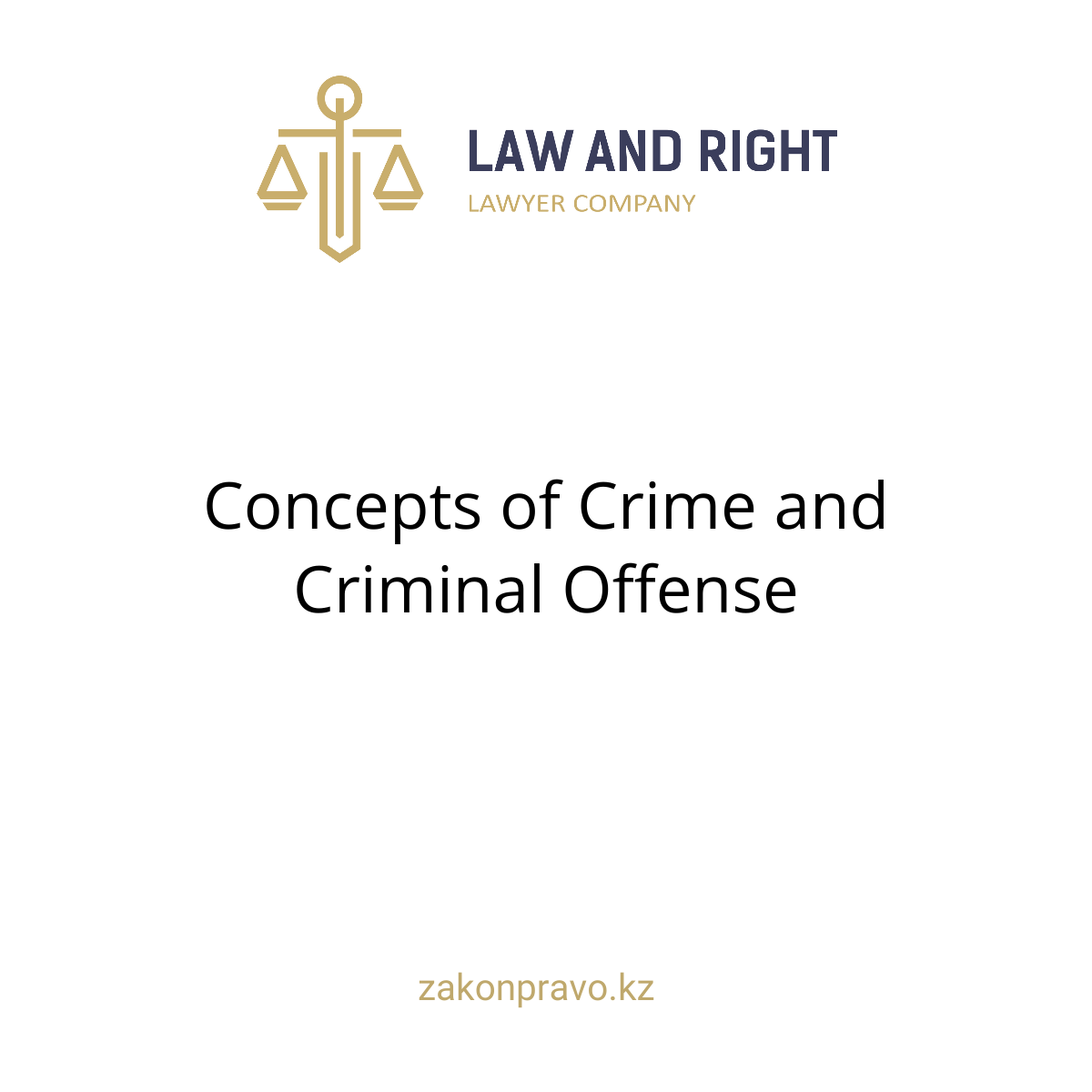Concepts of Crime and Criminal Offense
Article 10 of the Criminal Code of the Republic of Kazakhstan (hereinafter – the CC RK) defines the key concepts of criminal offense, crime, and criminal infraction, as well as the criteria for insignificance of an act. This article plays an important role in the classification of acts and the determination of their legal consequences.
1. Division of Criminal Offenses into Crimes and Criminal Infractions
Part 1 of Article 10 of the CC RK establishes that criminal offenses are divided into:
Crimes – more serious acts for which more severe penalties are prescribed;
Criminal infractions – less dangerous acts subject to milder penalties.
This division has practical significance, as crimes and criminal infractions entail different legal consequences. For example, a criminal record is established only for crimes, but not for criminal infractions (Article 79 of the CC RK).
2. Definition of Crime
Part 2 of Article 10 of the CC RK defines a crime as:
A culpable act (committed intentionally or negligently);
Socially dangerous (causing or threatening to cause significant harm);
Prohibited by the CC RK under threat of punishment, including imprisonment.
Thus, a crime is the most serious form of criminal offense that violates the rights of individuals, society, or the state.
Judicial Practice
The Supreme Court of the Republic of Kazakhstan, in its rulings, has clarified that in order to recognize an act as a crime, it is necessary to determine the degree of its social danger. For instance, in one case, the court qualified tax evasion as a crime because the damage to the state budget was significant and caused serious harm to state interests.
3. Definition of Criminal Infraction
Part 3 of Article 10 of the CC RK defines a criminal infraction as:
A culpable act (committed intentionally or negligently);
An act that does not pose significant social danger;
An act that caused minor harm or created a threat thereof;
Punishable by milder forms of penalty (fine, correctional labor, community service, arrest, etc.).
Examples of Criminal Infractions (Chapter 8 of the CC RK):
Intentional infliction of minor harm to health (Article 108 of the CC RK);
Insult (Article 131 of the CC RK);
Petty theft (up to 50 MCI) (Article 188-1 of the CC RK).
Judicial Practice
In one case, a person under the influence of alcohol damaged someone else's property of small value. The court qualified the act as intentional damage to property but recognized it as a criminal infraction due to the minor amount of damage and imposed correctional labor as punishment.
4. Insignificance of an Act
Part 4 of Article 10 of the CC RK establishes that an act is not considered a criminal offense if:
It formally contains the elements of a crime but lacks social danger.
This rule excludes criminal liability for acts that do not cause real harm or damage.
Examples of Insignificant Acts:
A person accidentally takes someone else’s pen and returns it the next day;
A child enters someone else’s property but causes no damage.
Judicial Practice
The Judicial Collegium of the Supreme Court considered a case of theft of bread worth 300 tenge from a supermarket. The court recognized the act as insignificant and denied the initiation of a criminal case, as no substantial harm had been caused.
Relationship with Other Legal Acts
Constitution of the Republic of Kazakhstan:
Article 39 guarantees the protection of human rights, including the presumption of innocence.
Code of the Republic of Kazakhstan on Administrative Offenses (CAO RK):
Establishes liability for acts not considered criminal offenses (e.g., petty hooliganism, Article 434 of the CAO RK).
Normative Resolutions of the Supreme Court of the RK:
Provide clarifications on the distinction between crimes, criminal infractions, and insignificant acts.
Conclusion
Article 10 of the CC RK plays a crucial role in the criminal law system by distinguishing between crimes and criminal infractions. This enables the individualization of criminal liability and helps to prevent the excessive criminalization of minor acts.
Attention!
Law and Law Law Law draws your attention to the fact that this document is basic and does not always meet the requirements of a particular situation. Our lawyers are ready to assist you in legal advice, drawing up any legal document suitable for your situation.
For more information, please contact a Lawyer / Attorney by phone: +7 (708) 971-78-58; +7 (700) 978 5755, +7 (700) 978 5085.
Attorney at Law Almaty Lawyer Legal Services Legal Advice Civil Criminal Administrative Cases Disputes Protection Arbitration Law Firm Kazakhstan Law Office Court Cases


